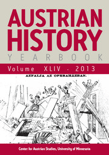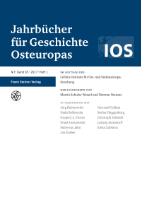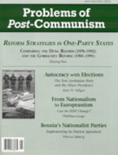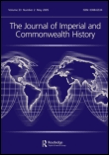
SOUTHEASTERN EUROPE
metrics 2024
Fostering Scholarly Dialogue on Southeastern European Dynamics
Introduction
SOUTHEASTERN EUROPE is a prestigious academic journal published by BRILL, focusing on the multidimensional analysis of the Southeastern European region. Established in the 1970s, the journal has evolved to become a vital resource for scholars in Cultural Studies, History, and Political Science. With its impact factor reflecting a robust influence within the academic community—ranking in the Q2 category for Cultural Studies and Q1 for History as of 2023—it serves as a critical platform for disseminating high-quality research and discourse. The journal supports various access options for its readers, ensuring a wide reach within both academic and policy-making circles. With a rich archive of issues from 1976 through to 2023, SOUTHEASTERN EUROPE is dedicated to fostering interdisciplinary dialogue and providing nuanced insights pertinent to the historical and sociopolitical dynamics of the region. For researchers, professionals, and students alike, this journal remains an essential tool for understanding the complexities and evolving narratives of Southeastern Europe.
Metrics 2024
 0.24
0.24 0.40
0.40 0.70
0.70 13
13Metrics History
Rank 2024
Scopus
IF (Web Of Science)
JCI (Web Of Science)
Quartile History
Similar Journals

Altre Modernita-Rivista di Studi Letterari e Culturali
Democratizing Knowledge through Literary InquiryAltre Modernita-Rivista di Studi Letterari e Culturali, published by Milano University Press, serves as a significant platform in the fields of Cultural Studies, Linguistics, and Literature. Since its transition to Open Access in 2009, this journal has made strides in democratizing knowledge, ensuring that resources and research are accessible to a broader audience. With an ISSN of 2035-7680, it publishes innovative research and critical discourse aimed at fostering interdisciplinary dialogue within the humanities. Although currently positioned in Q4 and Q3 quartiles, Altre Modernita is steadily contributing to academic conversation, promoting literary analysis, cultural critique, and linguistic exploration. Located in Italy, it invites contributions from scholars worldwide, encouraging a diverse range of perspectives. Altre Modernita remains a valuable resource for researchers, professionals, and students dedicated to understanding the complexities of modern literature and cultural narratives.

AMERICAN HISTORY
Connecting the Dots in American Historical DiscourseAMERICAN HISTORY is a pivotal journal published by HISTORYNET, dedicated to the exploration and analysis of historical narratives, events, and figures that have shaped the United States. With an ISSN of 1076-8866, this journal offers a comprehensive platform for historians, scholars, and students to publish and access critical research and discussions in the field. Although categorized in the Q4 quartile in the history domain according to 2023 metrics, its targeted scope from 2009 to 2023 ensures a rich reservoir of contemporary and historical research articles. Positioned at Rank #1711 out of 1760 in the Scopus database, AMERICAN HISTORY caters to a niche audience passionate about uncovering the complexities of American past. While it does not offer open access, its printed contributions are invaluable for those aiming to deepen their understanding of historical context in modern society. AMERICAN HISTORY stands as an essential resource for anyone engaged in detailed historical research and discourse.

Universum-Revista de Humanidades y Ciencias Sociales
Championing Access to Transformative ResearchUniversum - Revista de Humanidades y Ciencias Sociales is a pivotal academic journal published by UNIV TALCA, INST ESTUDIOS HUMANISTICOS JUAN IGNACIO MOLINA in Chile, dedicated to advancing scholarly discourse in the fields of humanities and social sciences. With an Open Access model implemented since 1986, the journal facilitates widespread access to research outputs, enabling greater engagement from researchers, students, and professionals alike. As of 2023, Universum holds a Q2 classification in the Arts and Humanities and a Q3 classification in Social Sciences, showcasing its commitment to excellence in scholarly contributions. The journal ranks #74/173 in General Arts and Humanities and #212/275 in General Social Sciences within Scopus, reflecting its impact and relevance in these disciplines. With a publication scope converging from 2008 to 2024, Universum is an essential resource for those seeking to explore innovative ideas and the latest research trends in the human and social sciences.

Austrian History Yearbook
Connecting Austrian Narratives with European HistoriesAustrian History Yearbook is a leading academic journal published by Cambridge University Press, focusing on the rich tapestry of Austrian history and its intersections with broader European narratives. With its ISSN 0067-2378 and E-ISSN 1558-5255, the journal has carved a niche within the academic landscape since its inception, offering insightful research and analysis that spans various periods and themes in Austrian history. Rated in the Q2 category for History in 2023, and boasting a respectable Scopus rank of #564 out of 1760 within the Arts and Humanities field, the Austrian History Yearbook stands out as a vital resource for historians, researchers, and students alike. The journal aims to promote scholarly discourse, foster critical engagement with historical texts, and contribute significantly to the historiography of Austria and its role in European history. With access options providing a gateway to an extensive repository of scholarly works, the journal serves as an essential platform for advances in historical research, making it indispensable for a global audience keen on understanding the complexities of Austrian heritage.

Comparative Southeast European Studies
Innovating Research for a Deeper Understanding of Southeast EuropeComparative Southeast European Studies, published by WALTER DE GRUYTER GMBH, is an esteemed open-access journal that has been contributing to scholarly discourse since its inception in 2021. With its ISSN 2701-8199 and E-ISSN 2701-8202, the journal is dedicated to the multidisciplinary examination of Southeast European societies, cultures, and economies. The journal strives to foster a nuanced understanding of historical and contemporary issues through an array of perspectives, appealing to researchers, professionals, and students alike. While it currently resides in Q4 for several categories including Anthropology, Economics, and Political Science, it maintains a robust platform for innovative research and dialogue within the region. Situated in Germany, this journal serves not only as a repository of knowledge but also as a catalyst for future scholarly endeavors, with the aim to elevate the discourse surrounding Southeast Europe during the converging years of 2021 to 2024. Its commitment to open access ensures that critical research is readily available, inspiring collaboration and engagement across academic and professional communities.

Anuario IEHS
Advancing knowledge through accessible research.Anuario IEHS is a prestigious open-access journal dedicated to the field of social sciences, published by the Universidad Nacional del Centro de la Provincia de Buenos Aires (UNICEN). Since its transition to open access in 2016, the journal has aimed to foster scholarly communication and accessibility, ensuring that cutting-edge research is freely available to all stakeholders in academia. Housed within the Faculty of Social Sciences, Anuario IEHS serves as a vital platform for researchers, professionals, and students who seek to engage with current societal issues and interdisciplinary scholarship. Reflecting the dynamic nature of social sciences, the journal publishes a variety of articles that contribute to the understanding of social phenomena, ensuring its relevance and impact in the academic community. With its commitment to quality and accessibility, Anuario IEHS continues to be a significant resource for those dedicated to advancing research and practices within the social sciences.

JAHRBUCHER FUR GESCHICHTE OSTEUROPAS
Decoding the Stories that Shaped Eastern EuropeJAHRBUCHER FUR GESCHICHTE OSTEUROPAS, published by FRANZ STEINER VERLAG GMBH, is a prominent academic journal dedicated to the exploration of Eastern European history. With its inception dating back to 1978, this journal has consistently provided a platform for scholarly discourse, contributing significantly to the understanding of the region's complex historical narratives. While the journal is not open access, it holds a solid reputation within the academic community, positioned in the Q4 quartile in history as per the 2023 category rankings, and stands at Rank #1636 within the Scopus Arts and Humanities History ranking. The convergence of its publication years throughout the decades emphasizes a long-standing commitment to historical research, thereby making it an essential resource for researchers, professionals, and students interested in Eastern European studies. Explore the intricate dynamics of historical events and cultural developments that shape Eastern Europe through this invaluable periodical.

PROBLEMS OF POST-COMMUNISM
Analyzing the Legacy and Future of Post-CommunismPROBLEMS OF POST-COMMUNISM is a distinguished academic journal focused on the critical examination of political, social, and economic transformations in post-communist societies. Published by Routledge Journals, Taylor & Francis Ltd, this journal features an ISSN of 1075-8216 and an E-ISSN of 1557-783X. With an impressive ranking of Q2 in the fields of Sociology and Political Science, and a Scopus position of #290/1466 (80th percentile), it stands as a vital resource for researchers and practitioners alike. The journal spans a convergence of years from 1996 to 2024, offering a rich archive of scholarship. Although it does not currently provide open access options, its rigorous peer-reviewed articles delve into the intricate dynamics shaping post-communist states, making significant contributions to contemporary academic discourse. Addressed to an audience keen on understanding the societal shifts and challenges facing these regions, PROBLEMS OF POST-COMMUNISM is essential for anyone seeking insightful analyses and robust dialogue in this evolving field.

OSTEUROPA
Unveiling Cultural Shifts in a Transforming RegionOSTEUROPA is a distinguished academic journal dedicated to the examination and analysis of social, cultural, and political developments in Eastern Europe. Published by BWV-BERLINER WISSENSCHAFTS-VERLAG GMBH, this journal has been a critical voice in the field since its inception in the mid-20th century, notably converging from various years to establish a comprehensive discourse on the dynamics shaping the region. With an ISSN of 0030-6428 and an E-ISSN of 2509-3444, OSTEUROPA taps into the expansive fields of sociology and political science, holding a reputable Q3 category ranking in these disciplines for 2023. While not currently an open access publication, it remains a vital platform for researchers, professionals, and students alike who seek to deepen their understanding of Eastern European affairs. The journal also ranks in the 17th percentile within the Scopus listings, underscoring its role as a significant, albeit niche, contributor to social studies and political science scholarship. Addressed from its base in vibrant Berlin, OSTEUROPA continues to foster intellectual dialogue and provide valuable insights into the complexities of Eastern European societies.

JOURNAL OF IMPERIAL AND COMMONWEALTH HISTORY
Navigating the intersections of past and present in global contexts.The JOURNAL OF IMPERIAL AND COMMONWEALTH HISTORY, published by Routledge Journals, Taylor & Francis Ltd, stands as a pivotal platform for scholarly discourse in the fields of imperial studies, history, and political science. This esteemed journal, with an ISSN of 0308-6534 and E-ISSN 1743-9329, has been contributing significantly to academic discussions since its inception in 1972 and continues to publish until 2024. With its categorical rankings placing it in Q1 in History, alongside emerging categories in Development and Political Science, it appeals to a wide array of researchers, professionals, and students interested in the complexities of historical and contemporary issues within imperial and commonwealth contexts. The journal's commitment to rigorous academic standards is reflected in its impressive Scopus rankings, which position it in the top percentiles of its respective fields. While currently not an open access journal, it remains a valuable resource for those looking to enhance their understanding of historical impacts and political relations in the imperial context, thereby solidifying its role as an essential tool for scholarly exploration and inquiry.